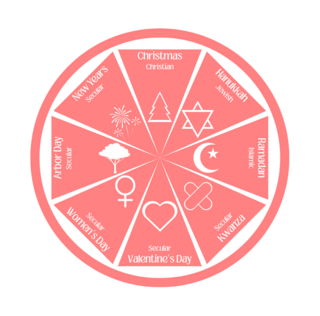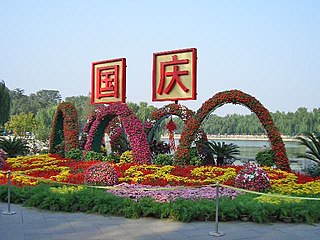| |||||
| Decades: | |||||
|---|---|---|---|---|---|
| See also: | Other events of 2024 History of Macau | ||||
| |||||
| Decades: | |||||
|---|---|---|---|---|---|
| See also: | Other events of 2024 History of Macau | ||||
Source: [1]

December is the twelfth and final month of the year in the Julian and Gregorian calendars. Its length is 31 days.

A holiday is a day or other period of time set aside for festivals or recreation. Public holidays are set by public authorities and vary by state or region. Religious holidays are set by religious organisations for their members and are often also observed as public holidays in religious majority countries. Some religious holidays, such as Christmas, have become secularised by part or all of those who observe them. In addition to secularisation, many holidays have become commercialised due to the growth of industry.

Labour Day is an annual holiday to celebrate the achievements of workers. Labour Day has its origins in the labour union movement, specifically the eight-hour day movement, which advocated eight hours for work, eight hours for recreation, and eight hours for rest.

In the Gregorian calendar, New Year's Day is the first day of the calendar year, 1 January. Most solar calendars begin the year regularly at or near the northern winter solstice, while cultures and religions that observe a lunisolar or lunar calendar celebrate their Lunar New Year at less fixed points relative to the solar year.

In the Gregorian calendar, New Year's Eve, also known as Old Year's Day, is the evening or the entire day of the last day of the year, 31 December. In many countries, New Year's Eve is celebrated with dancing, eating, drinking, and watching or lighting fireworks. Some Christians attend a watchnight service. The celebrations generally go on past midnight into New Year's Day, 1 January.

In the United States, public holidays are set by federal, state, and local governments and are often observed by closing government offices or giving government employees paid time off. The federal government does not require any private business to close or offer paid time off, as is the case for most state local governments, so employers determine which holidays to observe.
Bangladesh has numerous public holidays, including national memorial, religious and secular holidays of Bengali origin. The Bengali traditional calendar, known as Baṅgābda is the national and official calendar in Bangladesh. The holidays are celebrated according to Bengali, Islamic or Gregorian calendars for religious and civil purposes, respectively. Religious festivals like Eid are celebrated according to the Islamic calendar whereas other national holidays are celebrated according to the Bengali and Gregorian calendar. While the Islamic calendar is based on the movement of the moon, it loses synchronization with the seasons, through seasonal drift. Therefore, some public holidays are subject to change every year based on the lunar calendar.
Public holidays and statutory holidays in Hong Kong are holidays designated by the Government of Hong Kong. They allow workers rest from work, usually in conjunction with special occasions. Public holidays in Hong Kong are typically associated with traditional Chinese festivals, such as Lunar New Year, the Mid-Autumn Festival, and the Dragon Boat Festival. Other public holidays include National Day, Hong Kong Special Administrative Region Establishment Day, and Christmas Day.
Public holidays in Canada, known as statutory holidays, stat holidays, or simply stats, consist of a variety of cultural, nationalistic, and religious holidays that are legislated in Canada at the federal or provincial and territorial levels. While many of these holidays are honoured and acknowledged nationwide, provincial and territorial legislation varies in regard to which are officially recognized.

There are currently seven official public holidays on Mainland China. Each year's holidays are announced about three weeks before the start of the year by the General Office of the State Council. A notable feature of mainland Chinese holidays is that weekends are usually swapped with the weekdays next to the actual holiday to create a longer holiday period.

The observance of Christmas around the world varies by country. The day of Christmas, and in some cases the day before and the day after, are recognized by many national governments and cultures worldwide, including in areas where Christianity is a minority religion. In some non-Christian areas, periods of former colonial rule introduced the celebration ; in others, Christian minorities or foreign cultural influences have led populations to observe the holiday.

An academic year is "the period of the year during which students attend school or university". An academic year or school year is a period of time which schools, colleges and universities use to measure a quantity of study. It comprises school days and school holidays. Duration of school days, school year, and holidays vary across the world.

Buddha's Birthday or "'Buddha Day"' is a primarily Buddhist festival that is celebrated in most of South, Southeast and East Asia, commemorating the birth of the prince Siddhartha Gautama, who became the Gautama Buddha and founded Buddhism. According to Buddhist tradition and archaeologists, Gautama Buddha, c. 563-483 BCE, was born at Lumbini in Nepal. Buddha's mother was Queen Maya Devi, who delivered the Buddha while undertaking a journey to her native home, and his father was King Śuddhodana. The Mayadevi Temple, its gardens, and an Ashoka Pillar dating from 249 BCE mark the Buddha's birth place at Lumbini.
This is a list of the public holidays of the Malaysian state of Sabah and Sarawak. Dates given are those on which the holidays were celebrated in 2006. Some are Malaysian national holidays, while others are celebrated only in Sabah and Sarawak.

The Christmas season or the festive season; also known as the holiday season or the holidays, is an annual period generally spanning from late November to early January. Incorporating Christmas Day and New Year's Day, the various celebrations during this time create a peak season for the retail sector extending to the end of the period. Christmas window displays and Christmas tree lighting ceremonies are customary traditions in various locales.
Lists of holidays by various categorizations.

Chinese New Year is a festival that celebrates the beginning of a new year on the traditional lunisolar Chinese calendar. In Chinese, the festival is commonly referred to as the Spring Festival as the spring season in the lunisolar calendar traditionally starts with lichun, the first of the twenty-four solar terms which the festival celebrates around the time of the Chinese New Year. Marking the end of winter and the beginning of the spring season, observances traditionally take place from Chinese New Year's Eve, the evening preceding the first day of the year, to the Lantern Festival, held on the 15th day of the year. The first day of Chinese New Year begins on the new moon that appears between 21 January and 20 February.
In Sweden, public holidays are established by acts of Parliament. The official holidays can be divided into Christian and non-Christian holidays. The Christian holidays are jul (Christmas), trettondedag jul (Epiphany), påsk (Easter), Kristi himmelsfärds dag, pingstdagen (Pentecost), and alla helgons dag. The non-Christian holidays are: nyårsdagen, första maj, Sveriges nationaldag, and midsommar (Midsummer). Midsummer is, however, officially also a Christian holiday to celebrate John the Baptist's birthday.

In the United States there are a number of observed holidays where employees receive paid time off. The labor force in the United States comprises about 62% of the general population. In the United States, 97% of the private sector businesses determine what days this sector of the population gets paid time off, according to a study by the Society for Human Resource Management. The following holidays are observed by the majority of US businesses with paid time off: New Year's Day, New Year's Eve, Memorial Day, Independence Day, Labor Day, Thanksgiving, the day after known as Black Friday, Christmas Eve and Christmas. There are also numerous holidays on the state and local level that are observed to varying degrees.